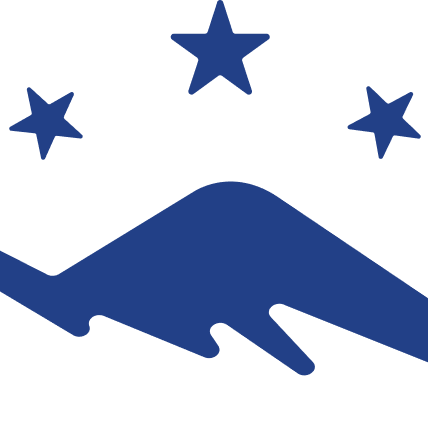It was a fight for the ages, a battle of wits that ended with the triumph of man over beast. I caught a fish. But it wasn’t just any fish — this was a beautiful, 30-inch long lake trout that weighed about 12 pounds.
A catch of that caliber might not have excited a hardier fisherman; a hardy fisherman I am not. Most of my adventures involve walking and climbing, and since this was my first time fishing on Lake Champlain I was ecstatic about reeling in the Big One.
A little guidance is always good
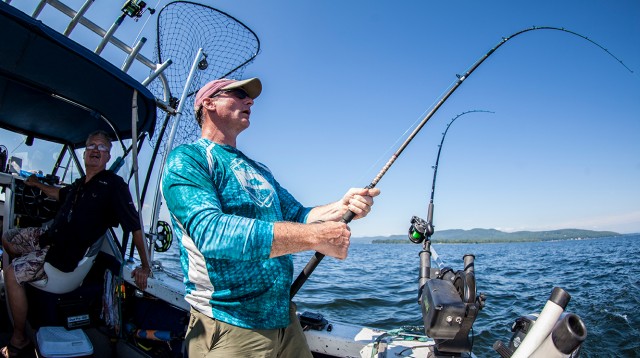
Our guides that day were two experienced Lake Champlain fishermen, Curt Kingsley and Jack “Action Jackson” Harrington.
We boarded Jack’s boat early in the morning at the Willsboro Bay state boat launch. Jack was taking us to a hotspot for fish, an expansive shoal called Schuyler Reef that lies about 100 feet below the surface of the lake. As we cut through the lake’s modest waves, Carl explained that he practically grew up with a fishing rod in his hand. His dad would take him fishing on nearby Lake George, and now he takes his son fishing. The pair went whitewater rafting and fishing for sockeye salmon in Alaska, where they dropped their lures within site of grizzly bears.
Even though Carl has fished elsewhere, the Adirondacks — especially the big lakes, like Champlain — call to him.
“Lake Champlain is some of the best fishing anywhere,” Carl said. “The thing about fishing in the Adirondacks is you can catch a lake trout that’s 25 years old. I have one on my wall at home that I got in 1988 in Lake Placid. It weighed 23 pounds, 8 ounces, and was 26 to 28 years old.”
Jack had a similar story. He grew up in Crown Point and fished with his dad as a child. They mostly hit streams and backcountry lakes and ponds, which Jack still fishes — it wasn’t until later that he discovered his love of fishing Lake Champlain.
Trolling around
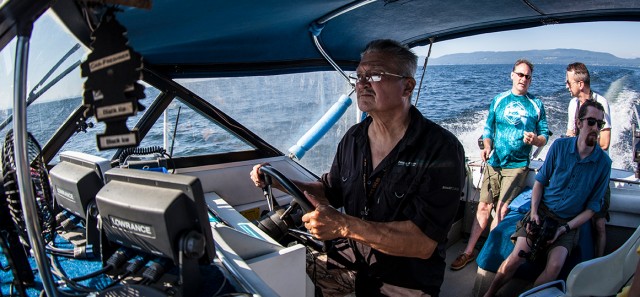
So there I was, a complete novice who was now in the middle of a beautiful and enormous lake with two seasoned fishermen. Mountains rose like waves around us; airborne cormorants zipped by, then settled on the water in the distance. They bobbed with the surf, as did our little boat.
Jack slowed the motor when we reached the shoal as Carl explained the technique we’d use to fish. He produced a lure that consisted of a bunch of shiny, fish-shaped spinners designed to mimic a school of fish. That would trail the boat from a distance, meanwhile, we’d keep an eye on the four rods mounted to the back of the boat, looking for any sign of a nibble.
We slowly trolled forward, the rod tips teasing us with slight twitches and bends. Not yet, not yet. But it didn’t take long. Suddenly, there was a deep arc on one of the corner poles. Carl sprang into action, and 5 minutes later there was a slippery, wriggling lake trout on board.
That got Carl and Jack talking about salmon, which live in the lake. They explained how different they are once they’re on the line. Large and spunky, they tend to make a run for it, sometimes exploding from the water in a glorious flash of fins and spray. They’re fighters, and the more our guides talked the more I wanted to hook one.
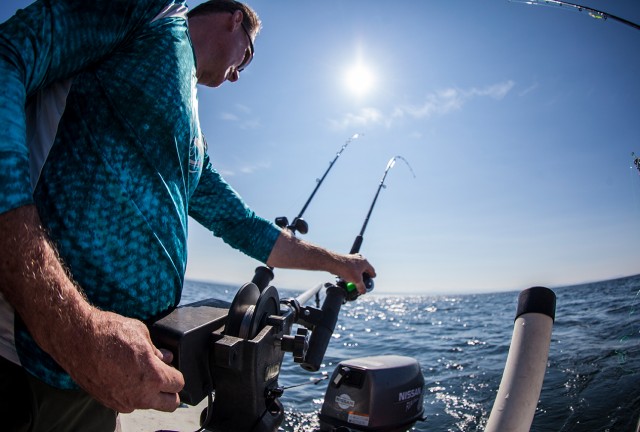
We were in mid conversation when the tip of another rod made a fast, deep bob. Action Jackson lived up to his name, springing from the captain’s chair to the back of the boat in one smooth move.
“Oh yeah, there’s something on here,” he said, resting the end of the rod against his waist.
Then, he turned to me.
“You should reel this one in.”
I took the rod with some hesitation — I hadn’t fished in 30 years, and I’ve never pulled in a lake monster before — but I immediately understood the allure. The line went taut, and my job was to control the tip of the rod in a way that created slack so I could reel in the prize. It’s a smooth, methodical movement in which the person holding the rod dips it toward the water’s surface to create slack, then pulls up and back while reeling. Too much tension and the line could snap, they warned.
I got to work, listening to Carl and Jack’s advice as I went: “Don’t give it so much slack! Reel faster!”
So I reeled and dipped, the pole feeling heavier as time passed. As I settled into a rhythm, I got more comfortable with it and started moving faster. Minutes passed — how long are these lines, anyway? — then a long, sleek body broke the water’s surface for a second, about 20 feet from where I stood.
Someone yelled, “Whoa! That’s a nice one!” but I was too busy to respond. Before I knew it, Carl was readying the net as I leaned and pulled the lake trout from the water. In one smooth motion it was on the deck, gasping and flopping at my feet.
If you’ve never seen a lake trout up close, let me tell you — they’re a stunning animal with mottled scales and subtle, yet vibrant, coloration. I held it up for the photo-op before returning it to its watery habitat.
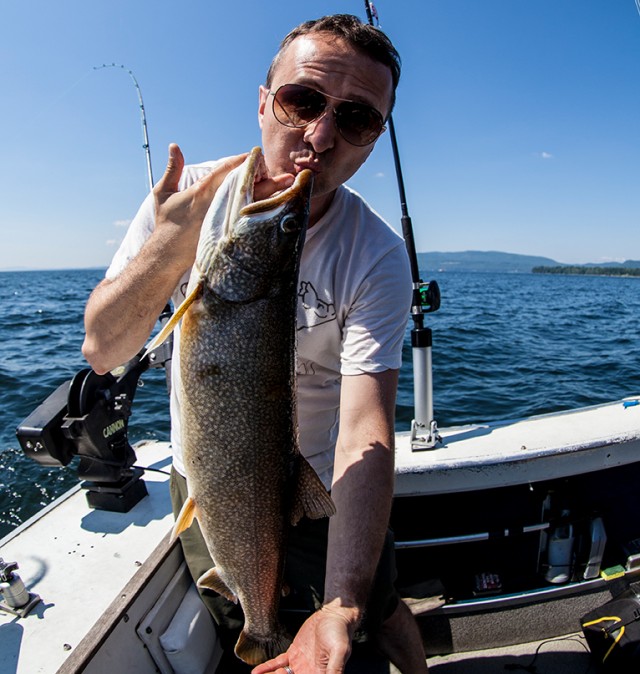
Land bound

We headed back toward the placid waters of the bay a bit later, and my fish remained the largest of the day. As soon as I reeled it in, I understood where Jack and Carl were coming from. It’s lovely being on the water, and the challenge of landing a fish is invigorating.
Of course, there were stories along the way, too. There was the time Jack went ice fishing on the lake, only to realize the section he was on had broken free and was floating toward open water. There was an outing where Jack caught about 30 lakers in four hours. Then there are the moments of glory: both men are regular competitors in some of the many fishing tournaments held on Lake Champlain, and they’ve even won a bunch.
But that’s not what it’s all about. As we settled down to lunch at Indian Bay Marina Restaurant, some of the questions I had were answered by watching them. Why don’t they provide a guide service? Or enter more competitions? Because they love to fish. It’s as simple as that.
If you're new to the Lake Champlain Region, get the most from your trip by hiring a guide to show you around. Once you're back on land, you'll find great dining and entertainment options.


